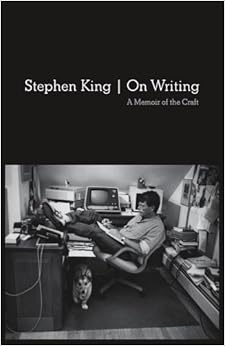When I was a teenager, I was a snobby little shit. I was unpopular, and eventually I came to own my outsider status. Part of that was finding ways to dislike everything that was popular; people in my high school, movies, music, even authors.
For roughly half of my thinking years, I considered Stephen King a hack.
Yep. That's right. Let your jeers rain down upon me, I can take it.
But then something happened. I read The Shining. If you can find a reason to talk trash on that book, I'll eat my beard. The storycraft is PERFECT. I was so drawn in, I started eyeing the bushes in my front yard with suspicion.
Later in life, after learning a lot more about writing and editing, I came to appreciate the idea of transparency in art. Art is best when the artist doesn't stand in the way of the piece. And King's best work is totally transparent. Of course, a person as well known as King has trouble staying completely out of the picture, but it's his fans that put him there. King himself is so focused on story that his work is mercifully free of his personal affectations and agendas. And that kind of transparency is what makes it possible to get pulled into a book. If you're reading a book and all you can think about is the writer's linguistic styling, or their political agenda, then the author is standing between you and the story. King may not always be on his A-game (nobody can write 55 novels without a couple stinkers), but he never gets in the way of his own work.
So by the time I read On Writing, I already had a more mature perspective on the guy. Thank God, because otherwise I would have missed out on this brilliant memoir.
The book was recommended to me (okay, thrust into my hands) by the man who would go on to publish 3 Futures, and I'll never be able to thank him enough for sharing it with me.
On Writing isn't so much a tutorial as it is one half of a conversation. King walks you through his personal journey to success, and in the process shares a wealth of useful tips and knowledge that any budding writer can appreciate. It's fun to hear his story presented in this context, and it's clear that the man is very aware of what he's doing.
King has intent. Nothing in his body of work is accidental or circumstantial. He has made himself into the man he is, and he has done so with purpose. And this is how all novelists ought to behave. Anyone can sit down at Starbucks and and bang on the keys, hoping the cute co-ed with the pumpkin-spice latte will ask them what they're writing. Anyone can come up with a series of events and some characters to run through them. But novels are fucking hard work, and anyone who isn't willing to bust their ass will fail.
So if you want to be a writer, know that it's not going to happen on accident. If you accept that, then you know you need to self-educate. Successful people never stop learning, and King's On Writing is the ideal place to begin learning when it comes to being a novelist. The book makes a friendly prologue to my writing bible, which gets much deeper and more technical as things go on.










No comments:
Post a Comment